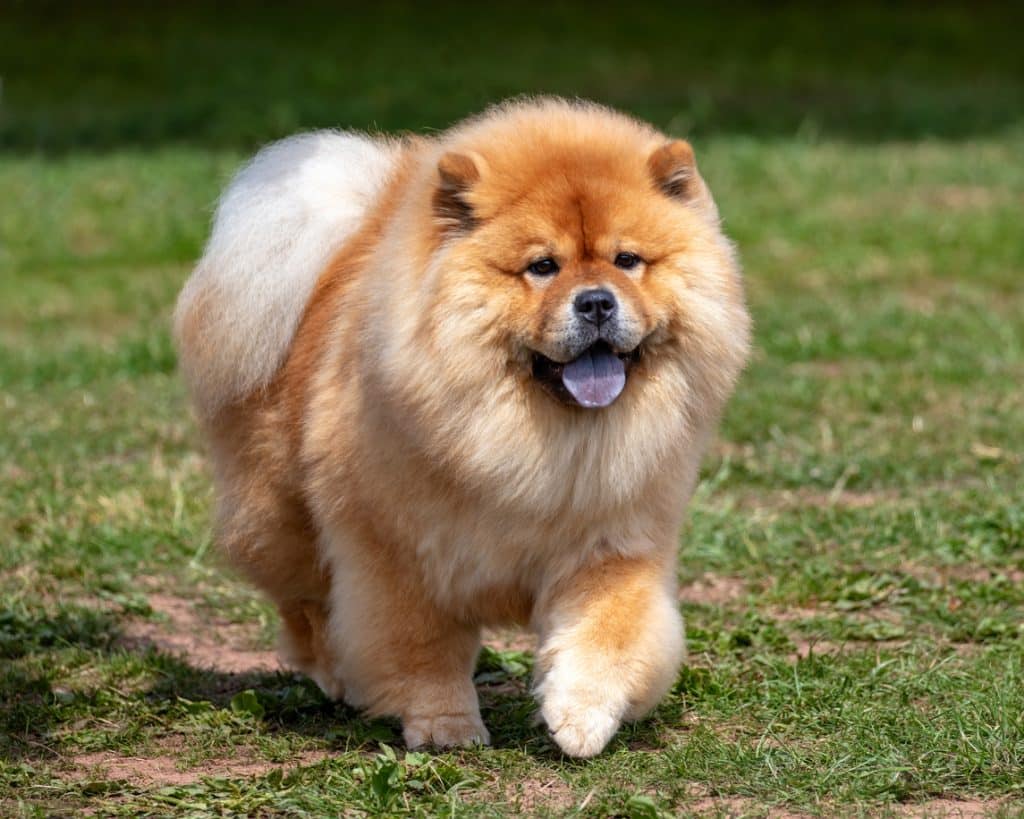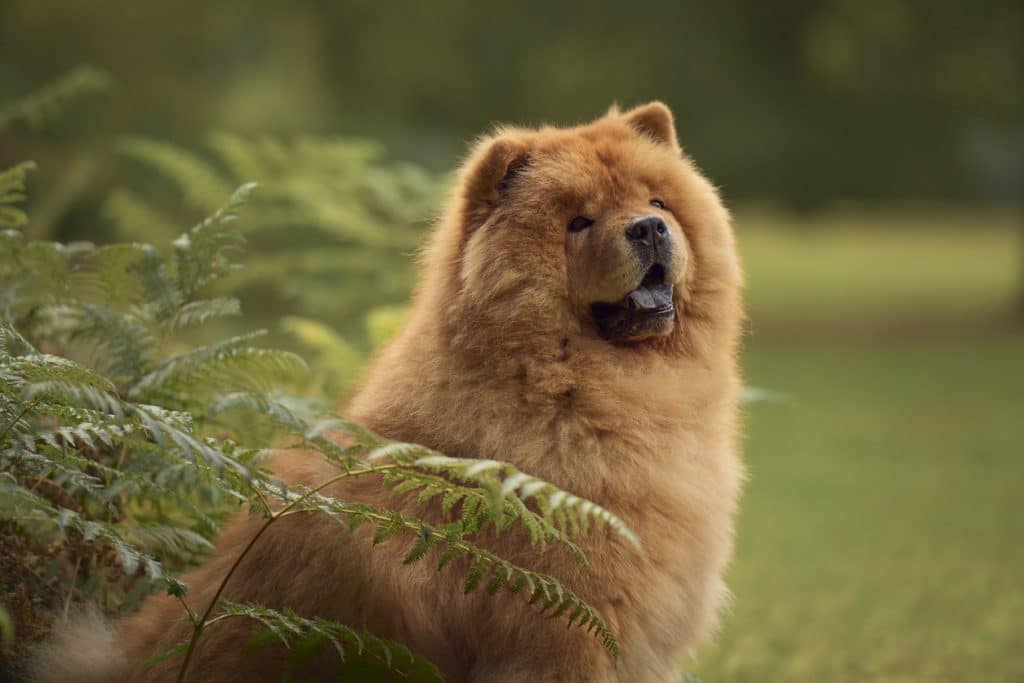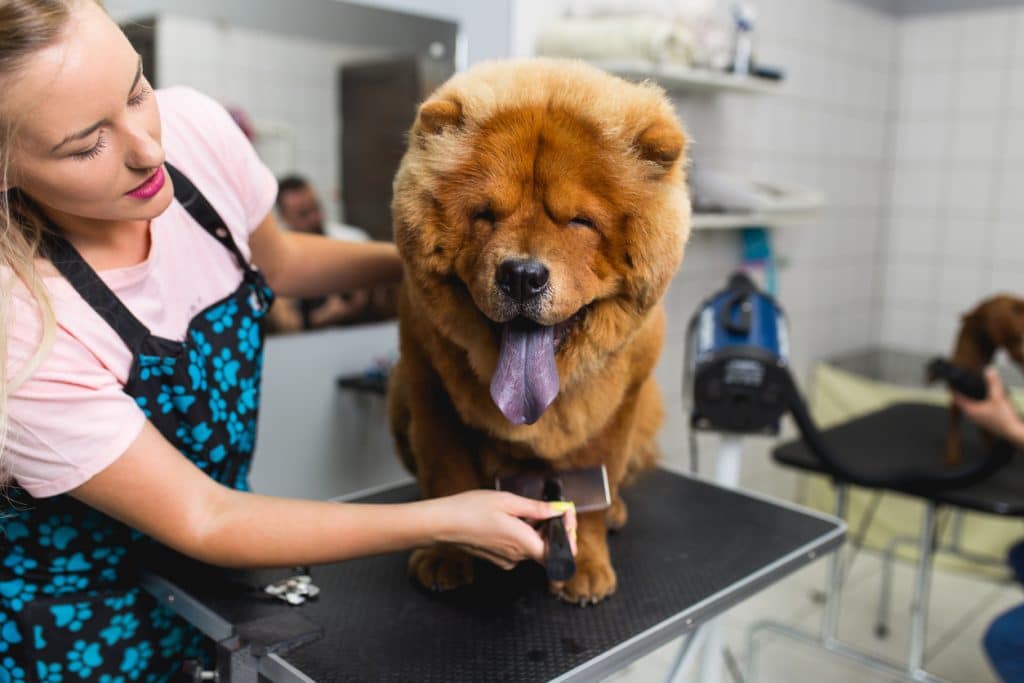
Have you ever seen a dog with a mane? No, it’s not part lion. It’s a Chow Chow! Just like the King of the Jungle, Chow dogs sport a regal appearance and a dignified personality. But these adorable ‘lion dogs’ aren’t for everyone: They need an owner willing to meet their needs for training, socialisation, and grooming.
If you think you’re up for the task, read on to learn more about this fascinating breed, including their history, personality, health, and more.
Key
- Low
- Medium
- High
- Origin: China
- Size:
- Weight: 45–70 pounds
- Activity level:
- Barking/howling level:
- Shedding: Seasonal
- Hair type: Smooth or rough
- Grooming level:
- Training level:
- Drooling level:
Ancestry
The Chow Chow is one of the oldest dog breeds in the world. They’ve been around for at least 2,000 years, dating back to the Han dynasty in China. Mongolian tribes originally used them as working dogs for tasks like hunting, pulling sledges, and guarding.
The breed first made its way to the West in the early 1800s and the UK Kennel Club officially recognised them in 1894, with the American Kennel Club (AKC) following suit in 1903. They’ve been gracing homes both sides of the Atlantic with their regal presence ever since.
Breed Characteristics
Chow Chows are sturdy medium-sized dogs, standing between 43 cm to 51 cm (17 to 20 inches) tall at their shoulders and weighing between 20 kg and 32 kg (45 to 70 pounds). They’re stout and muscular, with compact faces and upright ears, giving them that ‘teddy bear’ look. They also have a cute tail that curls back towards their spine and rests on their back.
Chow Chow coats
Chows can have rough or smooth coats, which can come in cream, red, black, blue, or cinnamon.
Rough-coated Chows have a fluffier appearance: They boast the signature, lion-like ‘mane’ and feathering on their legs. Meanwhile, smooth-coated Chows have a slightly sleeker appearance more in line with other Asian breeds, like Akitas.
Black tongues
Chow Chows sport one more unique trait: A blue-black tongue. Chow puppies start out with pink tongues that gradually change colour as they grow up. This doesn’t have anything to do with their oral health: It’s simply due to having more melanin pigment in their tongues. Some pups may even have birthmarks on their tongues in other colours, like white!

Personality
Chow Chows bear more in common with lions than their majestic looks: They actually have cat-like personality traits. They tend to be aloof, independent, and naturally shy. Chow Chows are also generally reserved and cautious around strange dogs and people, making them good guard dogs.
That said, Chows aren’t cold and distant: They can share a loving, goofy side with their family. So, they can make great companions for people who want a confident, mellow dog.
“They are a wonderful breed for the right person,” says Rafael Rosario, a breeder with the American Chow Club and founder of Rio Chows Kennel.
Exercise Requirements
Despite their tank-like appearance, Chows aren’t particularly active breeds. They only need moderate exercise every day, like a gentle walk around the block or a good play session. That said, some Chow Chows may enjoy heartier forms of exercise, such as dog sports, like agility or barn hunt. It can come down to your individual pup.
Training and Socialisation
Unlike many dogs, Chow Chows don’t live to please their humans. They can have a stubborn streak. So, training them can present a challenge. That’s why it’s important to begin obedience training a puppy early on. (Remember: positive reinforcement is key for all breeds!)
What’s more, Chow puppies need lots of socialsation to overcome any natural shyness. After they have their first shots, you should take them out to spend time with other dogs and people, says Rosario. Your friends can enjoy cooing over your new puppy, and your dog will get used to pets from strangers. Win-win!

Grooming
Both rough and smooth-coated Chow Chows need regular grooming to prevent matting. Most Chows prefer grooming from their owners, but this can be quite a task, thanks to all that floof.
Smooth-coated dogs need brushing at least twice per week. But rough-coated Chow Chows need brushing sessions daily, or every other day. In terms of fur fallout, Chow Chows shed their coats seasonally. So, you’ll be dealing with twice-yearly fur-nados. They also need nail trims once every week or two and regular tooth brushing.
Health
In general, Chow Chows live between eight to 12 years. Like all purebred dogs, they can struggle with health problems. Some of the most common health issues these dogs can inherit include:
- Hip dysplasia, when a dog’s hip socket is too shallow, causing discomfort and inflammation
- Patellar luxation, a condition where a dog’s kneecap dislocates, which can make them bow-legged
- Lymphocytic thyroiditis, the main underlying cause of hyperthyroidism in dogs
- Eyelid Entropion, a condition where a dog’s eyelids turn inward, causing pain and vision issues
Reputable Chow Chow breeders should screen their dogs for genetic health conditions before producing a litter.
Ideal Environment
As quiet dogs who don’t need vigorous exercise, Chow Chows don’t necessarily need their own garden: Rosario says they can do well in townhomes or apartments. Just make sure they have an outlet for exercise, like daily walks.
With their hearty coats, they can enjoy colder climates. But Rosario adds that Chow Chows can be prone to overheating. So, make sure they always have access to air conditioning if you live in a warmer area.
Ideal Family
A Chow Chow needs a human willing to socialise them and make them a part of the family, not just throw them out in the back garden, Rosario says. So, they’ll fit best into a family with plenty of time to devote to training.
Since Chows are generally low-energy dogs, they can be a good fit for less active families. They can learn to be civil around strange dogs, but won’t be social butterflies at the dog park. So, they’re best for people who won’t spend too much time around unknown dogs.
Chow Chows can also be wonderful with kids if they’re socialised properly, Rosario says. However, it’s still a good idea to supervise any dog around children, especially toddlers. Proper socialisation during puppyhood will also help Chow Chows get along with other household pets, like dogs and cats. But they can also be perfectly content as solo dogs.
Buying vs Adopting
The decision of whether to buy a Chow Chow from a breeder or adopt from a rescue is a personal decision. But in general, buying from a breeder is more expensive than adopting.
To find breeders who have to meet stringent requirements, it’s a good idea to look at those on the Kennel Club‘s assured breeder scheme and/or one with a five-star licence from the local council.
Rosario suggests looking for a breeder who regularly shows their dogs. This means they should adhere to the breed standard over turning a profit. Good Chow Chow breeders should also:
- Genetically test both parent dogs before breeding them
- Be active with a local kennel or breed club
- Make sure their puppies grow up well-socialised.
Rosario also adds that you can find many of these wonderful dogs in rescues. He explains that a rescue should evaluate a Chow Chow for their behaviour and to see how they act around children, so you’ll know what to expect.
Similar Breeds
Not sure if a Chow Chow is right for you? Other Asian dog breeds with a similar temperament include:
- The Akita. This Japanese breed is famous for their loyalty, aloof attitude, and bear-like appearance.
- Shiba Inu. Another Japanese breed with an independent streak, these small dogs may be ideal for those who’d like a smaller dog with a similar temperament.
Of course, a Chow Chow’s couch potato ways and aloof attitude may not be for everyone. For instance, if you want a dog who’s up for vigorous hikes and hour-long play sessions, a more active breed may be right up your alley, such as an Australian Shepherd. And if you’d prefer a friendlier dog, a more social breed, like the Golden Retriever, may be best for your family.

Conclusion
With their quiet dignity and independence, Chow Chows can make excellent family pets. If you’re willing to devote the time to training, socialising, and grooming them, this lion-like dog could make a regal companion.
References
- Rosario, N. (2024.) Personal Interview.
- Coile, C. (2024.) Chow Chow. https://www.britannica.com/animal/chow-chow
- DeGruy, V. (N.D.) An Oriental Masterpiece – The Chow Chow https://chowclub.org/ccci/breed-info/breed-profile-an-oriental-masterpiece-the-chow-chow
- (2020.) Official Standard for the CHOW CHOW https://s3.amazonaws.com/cdn-origin-etr.akc.org/wp-content/uploads/2020/06/26110822/Chow-Chow-07-29-20.pdf
- (N.D.) The Truth About Those Black Tongues. https://chowclub.org/ccci/breed-info/the-truth-about-those-black-tongues
- (N.D.) CCCI Obedience/Performance Committee. https://chowclub.org/ccci/breed-information/obedience-performance
- Privitello, K. (2003.) Socializing The Shy Chow Chow. https://chowclub.org/ccci/training-socialization-behavior/socializing-the-shy-chow-chow
- (N.D.) OFA-CHIC Health Testing Requirements. https://chowhealth.org/mambo/chow-health-articles/ofa-chic-health-testing-requirements
- (N.D.) https://chowhealth.org/mambo/chow-health-articles/ofa-chic-health-testing-requirements
- (N.D.) Thyroid Function in Dogs. https://cvm.msu.edu/vdl/laboratory-sections/endocrinology/thyroid-function-in-dogs
- Weir, M. et al. (N.D.) Eyelid Entropion in Dogs. https://vcahospitals.com/know-your-pet/eyelid-entropion-in-dogs
- (N.D.) Purchasing and Owning a Chow. https://www.chowclub.org/ccci/breed-information/purchasing-and-owning-a-chow/ailments
- DeGruy, V. (N.D.) Socializing Your Chow Chow. https://chowclub.org/ccci/training-socialization-behavior/socializing-your-chow-chow
- (N.D.) Chow Chow Adoption Frequently Asked Questions (FAQ.)https://chowclub.org/ccci/breed-info/adoption-faq-the-facts-about-adopting-a-rescued-chow